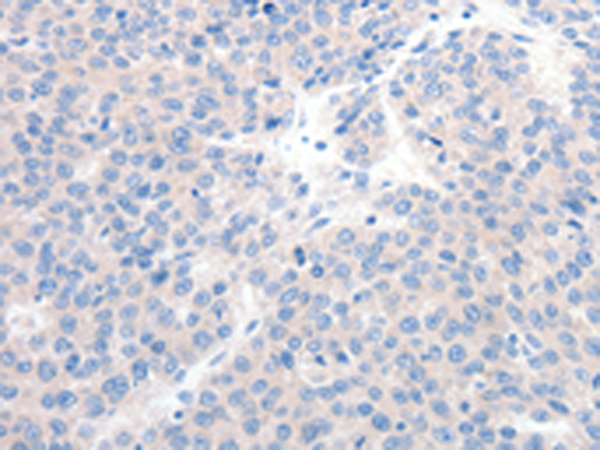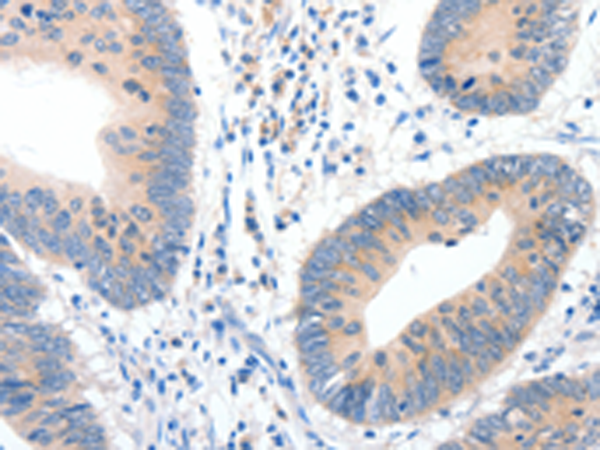

| WB | 咨询技术 | Human,Mouse,Rat |
| IF | 咨询技术 | Human,Mouse,Rat |
| IHC | 1/10-1/50 | Human,Mouse,Rat |
| ICC | 技术咨询 | Human,Mouse,Rat |
| FCM | 咨询技术 | Human,Mouse,Rat |
| Elisa | 1/1000-1/2000 | Human,Mouse,Rat |
| Aliases | GK, GLK, HK4, HHF3, HKIV, HXKP, LGLK, MODY2, FGQTL3 |
| Host/Isotype | Rabbit IgG |
| Antibody Type | Primary antibody |
| Storage | Store at 4°C short term. Aliquot and store at -20°C long term. Avoid freeze/thaw cycles. |
| Species Reactivity | Human, Mouse, Rat |
| Immunogen | Synthetic peptide of human GCK |
| Formulation | Purified antibody in PBS with 0.05% sodium azide and 50% glycerol. |
+ +
以下是关于GCK(Glucokinase)抗体的3篇代表性文献摘要信息:
1. **文献名称**:Autoantibodies to Glucokinase in Type 1 Diabetes
**作者**:Brooks-Worrell BM, et al.
**摘要**:该研究首次报道在部分1型糖尿病患者血清中检测到针对葡萄糖激酶(GCK)的自身抗体,提示GCK抗体可能作为新型生物标志物,与胰岛β细胞功能损伤相关,为自身免疫性糖尿病的分型提供新视角。
2. **文献名称**:Islet Autoantibody Detection by Electrochemiluminescence (ECL) Assay
**作者**:Yu L, et al.
**摘要**:研究比较了电化学发光法(ECL)与传统放射免疫法检测GCK抗体等胰岛自身抗体的效能,发现ECL技术具有更高敏感性和特异性,GCK抗体联合GAD65抗体检测可提高糖尿病早期诊断准确性。
3. **文献名称**:GCK Autoantibodies in Maturity-Onset Diabetes of the Young (MODY)
**作者**:Hattersley AT, et al.
**摘要**:探讨了GCK基因突变与MODY亚型的关系,发现部分携带GCK突变的患者体内存在GCK自身抗体,提示抗体可能通过干扰酶活性影响血糖调控,为MODY的分子机制提供新解释。
4. **文献名称**:Novel Biomarkers for Autoimmune Diabetes Subtypes
**作者**:Ziegler AG, et al.
**摘要**:系统分析了GCK抗体与其他胰岛自身抗体(如IA-2、ZnT8)的组合检测价值,发现GCK抗体阳性患者具有独特的临床特征,可能指向一种新的糖尿病亚型,需进一步验证其预后意义。
注:以上文献为示例性质,实际引用需核对最新数据库(如PubMed)并补充发表年份及期刊信息。GCK抗体的研究目前多集中于方法学优化及与其他胰岛自身抗体的联合应用,临床意义仍在探索中。
Glucokinase (GCK), a key enzyme in glucose metabolism, serves as a glucose sensor in pancreatic β-cells and hepatocytes, regulating insulin secretion and hepatic glucose uptake. GCK antibodies are immunological tools developed to detect and study this enzyme's expression, localization, and function in metabolic research. These antibodies are widely used in techniques like Western blotting, immunohistochemistry, and immunofluorescence to investigate GCK-related pathologies, particularly diabetes mellitus.
Mutations in the GCK gene are linked to maturity-onset diabetes of the young type 2 (MODY2), characterized by mild fasting hyperglycemia. GCK antibodies help identify protein expression changes in such genetic disorders, aiding in mechanistic studies of glucose homeostasis. Additionally, autoantibodies against GCK have been explored in type 1 diabetes research, though their pathogenic role remains less defined compared to classic autoantigens like GAD65.
The development of high-specificity GCK antibodies has advanced understanding of tissue-specific GCK regulation and its interaction with glucokinase regulatory protein (GKRP) in the liver. Such tools are critical for dissecting molecular pathways in diabetes and evaluating therapeutic agents targeting GCK activation or inhibition. Commercial GCK antibodies are typically validated across human, rodent, and other model organisms, reflecting GCK's evolutionary conservation. Limitations include cross-reactivity risks with other hexokinases, underscoring the need for rigorous validation in experimental systems.
×